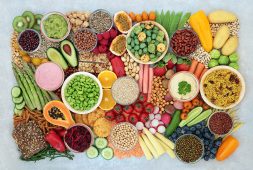
A recent study suggests that middle-aged women who incorporate plant proteins into their diets may have better overall health outcomes as they age compared to those who consume higher amounts of meat.
Conducted in the 1980s, the study analyzed data from nearly 49,000 women with an average of 49 who completed dietary questionnaires. Results, published in the American Journal of Clinical Nutrition, revealed that participants obtained approximately 13 percent of their daily calories from animal protein, 2 percent from dairy proteins, and 5 percent from plant proteins.
Animal protein sources included beef, chicken, seafood, milk and cheese, while plant protein sources encompassed bread, vegetables, fruits, pizza, cereal, baked items, mashed potatoes, nuts, beans, peanut butter, and pasta.
At the study’s onset, participants were free of 11 common chronic diseases, such as diabetes, heart disease, and cancer, and exhibited no physical or cognitive impairments. After approximately three decades of follow-up, about 3,700 women remained “healthy agers.”
Those who consumed higher amounts of plant proteins were found to be 46 percent more likely to fall into the category of healthy agers, while those with greater intake of animal protein were 6 percent less likely.
Lead study author, Andres Ardisson Korat, ScD, a scientist at the Jean Mayer USDA Human Nutrition Research Center on Aging at Tufts University in Boston, says, “The advantage of consuming more plant protein compared with other nutrients in the diet is that plant protein is associated with lower risk of cardiovascular disease and other chronic conditions. It promotes good physical function by enhancing muscle synthesis. And it comes from food sources that typically contain high-quality carbohydrates, such as dietary fiber, vitamins and minerals, and antioxidants.”
The Healthiest Sources of Plant Protein
Notably, the study reflects advancements in nutrition science since its inception. While bread may not typically be associated with plant-based protein, it can contribute to overall protein intake, according to Samantha Heller, RD, a registered dietitian in New York City, who wasn’t part of the study.
Heller says, “Proteins in foods such as grains contribute to the overall protein intake for plant-based eating styles. A cup of cooked pasta contains about 6 to 7 grams of protein. A typical slice of whole-wheat bread contains close to 4 grams of protein.”
Emphasizing whole grains over refined options like white bread or white rice is still advisable, notes Michal Melamed, MD, a professor at Albert Einstein College of Medicine and Montefiore Medical Center in the Bronx, New York. These low glycemic index foods, which release sugars more slowly, are believed to play a role in preventing chronic diseases.
“Choosing whole grains is healthier, especially if the person is predisposed to diabetes, because it takes the body longer to digest whole grains so that the release of the sugars takes longer. I would pick whole-wheat bread, brown rice, and sweet potatoes if possible and if the person has no other dietary restrictions,” says Dr. Melamed, who wasn’t involved in the new study.
David Jenkins, MD, PhD, a professor at the University of Toronto who wasn’t part of the study, highlights the importance of consuming plant-based proteins lower on the glycemic index to promote overall health.
However, the study did not specify which types of plant-based proteins offer the most benefits for healthy aging, nor did it identify potentially harmful sources of animal protein.
“Many of the plant protein foods are also low glycemic index foods that may be protective for diabetes, total cardiovascular disease, diabetes-related cancers such as breast and colorectal cancer, and all-cause mortality,” Dr. Jenkins says.
Ways to Cut Back on Meat Without Having to Eliminate It Completely
One limitation of the study is its failure to explore specific types of plant-based proteins that may offer the greatest advantages for healthy aging, or to identify potentially harmful sources of animal protein. Red and processed meats, in particular, have longstanding associations with various chronic health conditions. On the other hand, certain types of fish, particularly those rich in ogemga-3 fatty acids, have demonstrated heart-health benefits.
Nevertheless, the findings contribute to the growing body of evidence supporting the benefits of incorporating more plant-based meals into one’s diet, as noted by Melamed. Encouragingly, even minor dietary adjustments can yield positive outcomes, and individuals need not completely eliminate meat to experience some benefits.
Melamed says, “On the whole, people need to keep in mind that eating animal protein in the long run, is probably not healthy.” But she adds that it’s okay to cut back in the way that makes sense to you.
Melamed says, “Sometimes people switch gradually, becoming pescatarian, then vegetarian, then vegan. Sometimes people are able to cut out meat altogether but still eat meat on special occasions. There is a wide range of healthy dietary choices that people make.”



